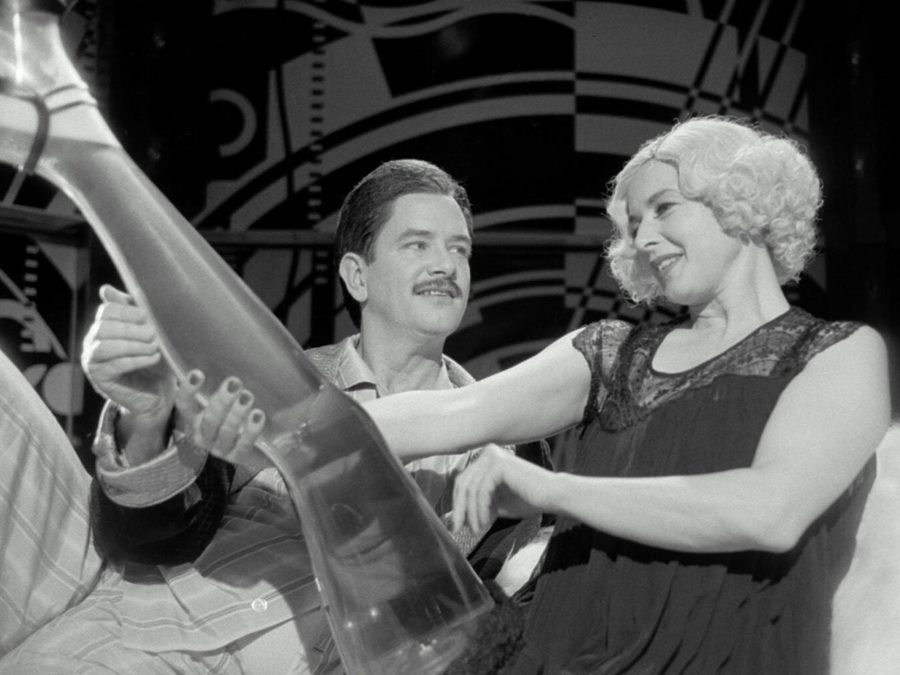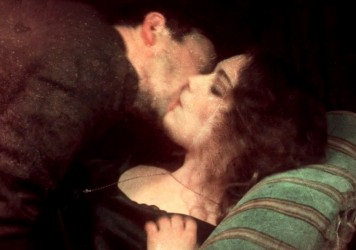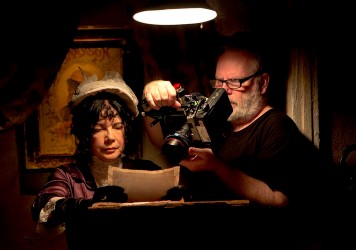
“If I’ma be sad, I’ma do it with pizzazz,” sings Canadian rapper Akintoye in his viral TikTok song ‘Pizzazz’. Fans of the cult filmmaker (and likewise Canadian) Guy Maddin might recall this is pretty much verbatim how Broadway producer Chester Kent (Mark McKinney) pitches his vision for an American musical spectacular in The Saddest Music in the World. The film is now 20 years old, though owing to Maddin’s unique visual style it has the look of a work closer to 100: Caligari-esque sets and oneiric rear projections are captured on grainy black and white film shot through Vaseline-coated lenses, with occasional colour interludes that evoke the look of two-strip Technicolor.
The film is very loosely based on an unpublished short story by Kazuo Ishiguro, though those hoping for anything resembling The Remains of the Day will likely come away baffled. In tone, it increasingly looks to have more in common with the doomer humour of contemporary internet culture. The Saddest Music in the World is a meditation on melancholy as only Maddin could make it: this is a film that begins with a fortune teller prophesying doom for Chester if he doesn’t take his own misery seriously, and ends with a lavishly staged dramatization of the ‘Alaskan Kayak Tragedy of 1898’ sung by a woman with hollow glass legs filled with beer.
But I’m getting ahead of myself. The film is set in Winnipeg, 1933, where Canadian beer magnate Lady Helen Port-Huntly (Isabella Rossellini) is looking to cash in on the impending end of American prohibition. How will she bring her thirsty neighbours flocking across the border to frozen Winnipeg, chosen “four years in a row by The London Times as the world capital of sorrow in the Great Depression”? Simple: an international contest to see which nation can produce the saddest music in the world, with a hefty $25,000 prize. “If you’re sad, and like beer,” she announces, “I’m your lady.”
By chance, down-on-his-luck Chester has just arrived in town with his amnesiac girlfriend Narcissa (Maria de Medeiros). Recognising the competition as a chance to rejuvenate his career, Chester announces his intention to compete on behalf of America – much to the displeasure of his fiercely patriotic father, the improbably named veteran Fyodor Kent (David Fox), who will represent Canada.
The music competition itself is stagged like a talent show face-off, not unlike the Battle stages in The Voice. An abrasive buzzer punctuates each round, and the entire contest is narrated like a sport, complete with preposterous national stereotyping. The first match – “Siam vs Mexico ” – pits a solo flute player against a family mariachi band. “You can almost hear the typhoon bearing down on the defenceless seaside village,” one commentator solemnly notes. The victors of each round slide down a chute into a vat of beer.
The Saddest Music in the World is about how feeling – and the art that comes from it – is compromised by capitalism, with America especially willing to transform all our deepest pain and sorrows into easily digestible spectacle. Lady Port-Huntly reasons the saddest nations will be the most willing to drown their sorrows, and therefore the easiest to milk for profit. Meanwhile, Chester cynically sees an opportunity to shape all this grief into popular entertainment: “Sadness is just happiness turned on its ass. It’s all showbiz!” There’s an especially pointed critique here about America’s nefarious ability to co-opt diverse cultures for its own ends; over the course of the film Chester recruits or otherwise buys off his opponents with vague promises of riches and stardom, even roping in some Indians to play doomed “Eskimos” for his apocalyptic showstopper, a nod to Hollywood’s ugly past when it comes to exploitative spectacle and racist casting.

None of this bothers Chester, who didn’t cry at his mother’s funeral. By contrast, his twitchy, hypochondriac brother Roderick (Ross McMillan) is characterised by an excess of sentiment; he carries with him at all times the heart of his dead son, preserved in a jar of tears. Roderick arrives in Winnipeg to compete for his adoptive homeland of Serbia – where the first shots of the Great War were fired, and thus the only country that matches his level of despair – under the pseudonym “Gavrilo the Great,” a world-famous cellist who sports a black veil and Groucho Marx-like fake eyebrows and moustache. During his musical duel with Scottish bagpipers, Roderick is so overcome with emotion he loses consciousness. “We don’t know if he’s in a coma,” the commentator earnestly notes, “or just very, very sad.”
In contrast to more recent films that meticulously emulate earlier styles of cinema, and which ask us to judge them on the basis of their stylistic fidelity – films as diverse as Black Dynamite, The Artist, The Love Witch, and X – Maddin isn’t hung up on the details. He doesn’t try to emulate the silent or early sound periods so much as imagine how those films might be remembered by someone with no access to them. The closest comparison might be another underappreciated 2003 gem, Peyton Reed’s Down With Love, which similarly approaches its pastiche with a certain looseness in order to keep things from getting too academic.
Maddin’s work, despite its brilliance, continues to exist at the fringes of film culture. At the time of writing, The Saddest Music in the World isn’t currently streaming anywhere in the UK, and is long out of print on DVD, which is a shame, because this film’s unique blend of cynicism and sincerity seems especially likely to strike a chord with modern audiences, hyper-aware that every negative emotion can be repackaged as content for consumption.
Gone (for the most part, at least) are the days of late-night sadfishing on Tumblr – now mental health struggles are addressed in the form of darkly humorous memes that even brands capitalise on. This shift is perhaps a result of desensitisation and adaptation to the neoliberal hellscape we find ourselves in. Gen Z faces diminished job and housing security, a constant influx of distressing news via social media, and an escalating cost of living; it’s hardly a surprise that the most depressed generation turns to black comedy as a coping mechanism. Maddin’s film takes on renewed resonance in an age characterised by corporate-approved toxic positivity and apps that harvest users’ data to sell their sadness right back to them – chiming with a situation where ‘sadness with pizzazz’ becomes an ironic badge of pride.
Chester’s cheerful cynicism and Roderick’s ridiculous self-pitying make for some great one-liners; I’m particularly fond of Chester’s claim that he’s “got schmaltz routines that could ring sobs from a moose.” But Maddin’s hyperbolic comedy, as well as the emotional distance of the film’s style, paradoxically underscores that there are actual emotions being kept at bay. It’s no coincidence that the film takes place during the Great Depression, in the shadow of the First World War with its “nine million dead” as characters keep reminding us. Each of the protagonists is confronted with their inability to properly respond to pain and suffering: Chester is unwilling to let in negative emotions; Roderick is unable to escape his sorrow; Lady Port-Huntly is haunted by her traumatic past; and Narcissa is unable to even remember her own.
A remedy for the affective disorder that seems to have grasped Winnipeg – and perhaps the world – is suggested by the film’s appropriation of Jerome Kern’s ‘The Song Is You’ from Music in the Air. The song has a history with the movies; it was shot for a 1934 film version of the musical, but deleted from the final print, despite being the show’s best-known number. In Maddin’s film ‘The Song Is You’ gets its revenge on the silver screen, appearing in no less than nine different versions: in flashback, sung by Fyodor’s wife; on the streets of Winnipeg, courtesy of a jolly chorus of hockey plays; and most potently in a solo performance on Roderick’s tortured cello. ‘The Song Is You’ isn’t exactly a sad song, but with each reinterpretation it becomes more and more poignant, revealing an underlying melancholy that characters can only express through music. In Maddin’s telling, the song is whatever you make of it.
Published 25 Oct 2023

The filmmaking duo discuss their beautiful, bewildering fever dream.

He's leading today's wave of announcements concerning the 'LFF Expanded' programme of immersive art forms.

The Canadian director uses a bespoke algorithm to take audiences on a unique interactive journey.